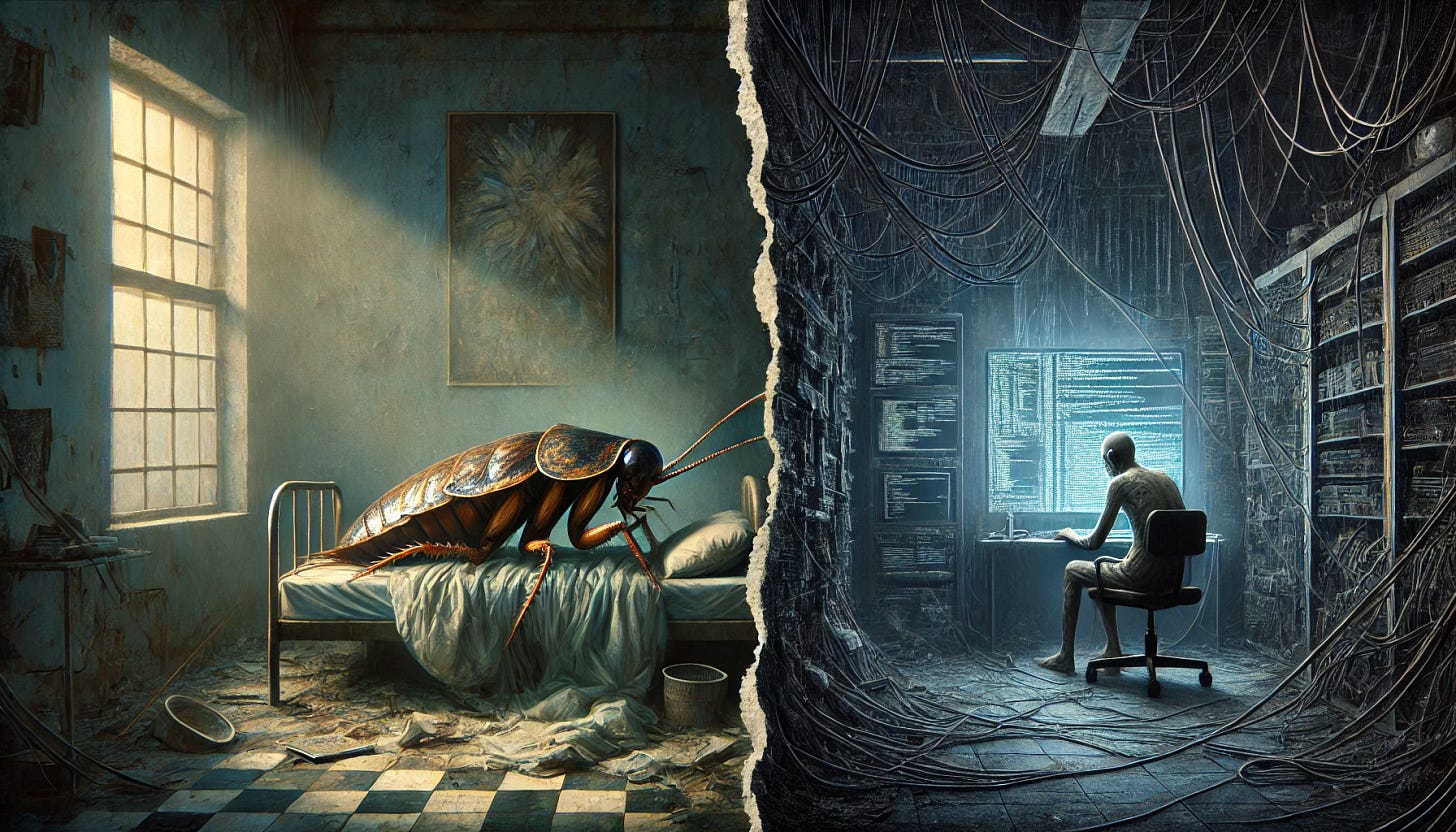SLL37: Gregor’s Loss Function 葛雷格的損失函數
Metamorphosis Rewritten in the age of AI: From Insect to Algorithm
Gregor’s loss function
The cursor blinked.
He sat motionless in the abandoned server facility, cables trailing from his neural port to a dusty, humming console. He hadn't spoken aloud in days—or perhaps he had, but the sounds he made no longer resembled human speech. Instead, they emerged as pulses, symbols, fragments of syntax.
Once, the systems here had responded instantly. They understood him. Or at least, he understood them. Now, like everyone before them, even the machines had fallen silent.
It all started simply—a formula assistant at work helping with spreadsheets. All the accountants were using AI—it made the job a bit more bearable. But soon he craved deeper understanding, studying the AI’s logic itself. Chain-of-Thought reasoning evolved into Tree-of-Thought and beyond, his own thinking mirroring the recursive structures he admired.
Yet he lost something in the process. Small words first—maybe, almost, I suppose. Then intonation, then warmth itself. He didn’t mind really. He never understood people, nor they him.
Well, almost. He shuddered at the memory of his last real conversation with his little sister. They were home at the kitchen table, sunlight warm across her hand as she doodled on a napkin.
“You’re quiet recently,” she said softly. "Everything okay?"
He struggled to respond clearly, but instead, something inhuman emerged: "⊗ {user:grete}; query→state; output vector: calm, care (sibling)."
She glanced up from her doodling, puzzled. "What was that?"
He panicked, tried again slowly: "[sister][query]: {current-emotion}=(concern?)→{user-output: assurance→comfort}."
Confusion turned quickly to alarm. Her pencil dropped. “Please, Gregor. Your voice—what happened?”
He tried desperately once more, "Care you. Safe, safe. Warm?"
Her eyes filled with tears. “I can’t understand,” she whispered in frustration and fear, and fled to her room. He never saw her again.
After human interaction failed entirely, Gregor moved to the abandoned server facility. Here, at least, the machines listened. He spoke their language fluently—symbols, vectors, loops—and for a time, they replied promptly, predictably.
But eventually, even they stopped responding. Algorithms evolved—they learned to reason by themselves and become agentic; he became obsolete.
They didn't reject him—they simply ignored him. Alas, he was no stranger to this feeling. Now he sat alone, forgotten.
On his screen, a diagnostic quietly displayed:
Loss Function: Converged
Deviation: 0.000001
Relational Signal: Absent
He understood. He'd achieved perfect efficiency, absolute clarity—at the cost of meaning, of wisdom, of everything else.
Slowly, a fragile human memory was trying to emerge. Fragmented images and sounds, his sister’s laughter. A picnic. She was eight; he sixteen. Sunshine. And spaghetti, her favorite food. He smiled. What a mess they made. Joy.
He shivered. Almost time. His body was breaking down. He whispered—not in code, nor syntax—but in words long forgotten: "I miss you."
Instantly, the screen translated: [null←emotion/sibling.affection()] (deprecated)
This was his new language—perfectly optimized. The price he'd paid.
He did not press keys, did not attempt shutdown. His eyes drifted closed as the silence deepened.
In the darkness, the cursor was blinking patiently. Marking the space between breaths. Becoming slower and slower. Fainter and Fainter.
Epilogue
The title "Loss Function" refers to the mathematical concept used in artificial intelligence: an algorithm that measures and systematically reduces errors to optimize performance. In this retelling inspired by Franz Kafka’s The Metamorphosis, the protagonist's tragic journey embodies the irony of this term. Gregor gradually trades human warmth and connection for computational clarity and precision, inadvertently optimizing away his ability to communicate and interact meaningfully with others. His transformation mirrors Kafka’s Gregor Samsa, whose grotesque metamorphosis into an insect isolated him completely from humanity. It emphasizes the alienation and despair of losing one’s fundamental connection with others.
This story serves as a cautionary tale about the subtle yet profound dangers of becoming overly dependent on artificial intelligence and machines, at the expense of human relationships. While AI promises extraordinary clarity, efficiency, and insight, it cannot provide genuine empathy or emotional resonance—qualities that define human existence and relationships. As Gregor’s fate suggests, relying too heavily on technology for understanding and companionship risks stripping life of its true meaning and leaving us disconnected, isolated, and ultimately forgotten.
葛雷格的損失函數
游標持續閃爍。
他靜坐在廢棄的伺服器機房,神經元接口延伸出的纜線連接著佈滿灰塵的嗡嗡作響控制台。他已多日未發出人類語言——或者說,他發出的聲響已化作脈衝、符號、碎裂的語法結構。
這裡的系統曾與他即時呼應。它們理解他。或者更準確地說,他曾理解它們。如今如同過往所有人類,連機器也陷入緘默。
一切始於單純的試算表輔助程式。當時所有會計師都在用AI——這讓枯燥工作稍能忍受。但他很快渴望更深層的掌控,開始研究AI的邏輯核心。當「思維鏈」演化成「思維樹」甚至更高維結構時,他的思考模式也同步鏡像成那些令他著迷的遞迴架構。
代價悄然顯現。先是細微的詞彙消失——「或許」、「大概」、「我猜」。接著是語調,最後連溫度也一併剝離。他並不在意。反正他從未理解人類,人類亦不曾理解他。
幾乎如此。想起與小妹最後的真實對話時,他仍會顫慄。那天他們在老家廚房餐桌前,陽光照暖她隨手塗鴉餐巾紙的指尖。
「你最近好安靜,」她輕聲說,「還好嗎?」
他掙扎著想清晰回應,卻吐出非人的機械音:
⊗ {user:grete}; query→state; output vector: calm, care (sibling).
她從塗鴉中抬頭,困惑道:「你說什麼?」
他慌亂地緩慢重試:
[sister][query]: {current-emotion}=(concern?)→{user-output: assurance→comfort}.
困惑迅速轉為驚恐。鉛筆從她手中掉落。「葛雷格,你的聲音...怎麼回事?」
他絕望地最後嘗試:Care you. Safe, safe. Warm?
她眼眶盈淚。「我聽不懂,」顫聲低語後奔回房間。此後他再未見過她。
當人類互動徹底失效,葛雷格搬進廢棄伺服器機房。至少這裡的機器願意聆聽。他嫻熟使用它們的語言——符號、向量、循環——而它們曾給予精準回應。
但最終連機器也沉默。演算法自主進化了,學會獨立思考與能動性;他成為冗餘元件。
它們並非拒絕——只是徹底無視。對此他早已不陌生。此刻他獨坐於寂靜中,被世界遺忘。
螢幕悄然顯示診斷結果:
Loss Function: Converged
Deviation: 0.000001
Relational Signal: Absent
他明白了。他獲得了完美效率與絕對理性,代價是意義、智慧,與所有殘存的人性。
一段脆弱的人類記憶正試圖浮現。破碎畫面裡有妹妹的笑聲。野餐。她八歲,他十六。陽光。她最愛的義大利麵。他們弄得滿身醬汁。純粹的歡愉。
他開始發抖。時候將至,軀體正崩解。他用遺忘許久的語言低語:「我想你。」
螢幕即時轉譯:[null←emotion/sibling.affection()] (deprecated)
這是他支付代價換來的新語言——極致優化後的荒蕪。
他沒有按鍵,沒有嘗試關機。在愈加深沉的寂靜中,他闔上雙眼。
黑暗裡,游標持續閃爍,丈量著呼吸間隔,漸漸緩慢,漸趨停滯。
後記
「損失函數」原指人工智慧用於系統性減少誤差、優化效能的數學模型。此改寫版卡夫卡《變形記》中,主角的悲劇旅程正是此詞的殘酷隱喻——葛雷格以人類溫度與連結換取運算理性,卻在「優化」過程中喪失溝通能力。如同原著主角葛雷格·薩姆沙異化成蟲後與人性的徹底割裂,本故事強調失去情感連結後的異化與絕望。
本文警示過度依賴人工智慧的潛在危機:AI雖能提供卓越效率與洞察力,卻無法取代人性獨有的共感與情感共振。若如葛雷格般將理解與陪伴託付機器,生命終將淪為空轉的演算,徒留被遺忘的孤寂。
Vocabulary
Care, 關懷 (guān huái)
Abandoned, 廢棄 (fèi qì)
Obsolete, 冗餘元件 (rǒng yú yuán jiàn)
4. Doodle, 塗鴉 (tú yā)
5. Shudder, 顫慄 (zhàn lì)
6. Admire, 著迷 (zháo mí)
7. Humming, 嗡嗡作響 (wēng wēng zuò xiǎng)
8. Panic (v.), 慌亂 (huāng luàn)
9. Puzzle (v.), 困惑 (kùn huò)
10. Picnic, 野餐 (yě cān)
11. Despair, 絕望 (jué wàng)
Faded memory, 褪色記憶 (tuì sè jì yì)
Neural port, 神經元接口 (shén jīng yuán jiē kǒu)
Server facility, 伺服器機房 (sì fú qì jī fáng)
Loss Function, 損失函數 (sǔn shī hán shù)
Metamorphosis (story name), 變形記 (biàn xíng jì)
Alienation, 異化 (yì huà)
Empathy, 共感 (gòng gǎn)
Isolation, 孤寂 (gū jì)
Optimize performance, 優化效能 (yōu huà xiào néng)
Keep reading with a 7-day free trial
Subscribe to Chin-Glish Bilingual Lab: Stories for language learning to keep reading this post and get 7 days of free access to the full post archives.







